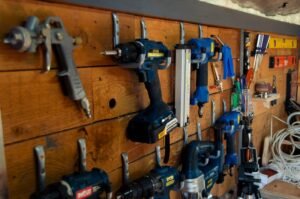When working with tools, safety is paramount. Essential safety gear includes eye protection, such as safety glasses or goggles, to shield eyes from debris and dust. Ear protection, like earplugs or earmuffs, is crucial when using loud power tools to prevent hearing damage.
Dust masks or respirators filter out harmful airborne particles, protecting the respiratory system. Gloves safeguard hands from cuts, scrapes, and splinters, while slip-resistant footwear helps prevent accidents in the workshop. Consistent use of appropriate safety gear significantly reduces injury risks.
Hand tools are fundamental in workshops for various tasks. Common hand tools include hammers for driving nails and shaping metal, screwdrivers for manipulating screws, wrenches for turning nuts and bolts, pliers for gripping, bending, and cutting, and hand saws for cutting wood and other materials. High-quality hand tools with ergonomic handles reduce hand fatigue and improve comfort during use.
Durability and proper construction are important factors when selecting hand tools. Maintaining hand tools is essential for their longevity and performance. Regular cleaning and lubrication prevent rust and corrosion.
Proper storage in a dry, organized environment helps prevent damage. A well-maintained collection of hand tools enables efficient completion of various projects.
Key Takeaways
- Safety gear is essential for protecting yourself while working with tools, including items such as safety glasses, gloves, and ear protection.
- Hand tools are versatile and essential for any workshop, including items such as hammers, screwdrivers, and pliers.
- Power tools can make tasks easier and faster, but it’s important to use them safely and follow all manufacturer instructions.
- Measuring and marking tools, such as tape measures and levels, are crucial for ensuring accuracy in your projects.
- Fasteners and adhesives are necessary for joining materials together, with options including nails, screws, and various types of glue.
Power Tools
Types of Power Tools
Drills are versatile tools that can be used for drilling holes and driving screws with the use of different attachments. Saws come in various types, such as circular saws, jigsaws, and miter saws, each designed for specific cutting tasks. Sanders are used for smoothing out rough surfaces, while routers are essential for shaping edges and creating intricate designs.
Safety Precautions
When using power tools, it’s crucial to prioritize safety and follow proper operating procedures. Always wear appropriate safety gear, such as eye and ear protection, when using power tools. Additionally, familiarize yourself with the specific features and functions of each power tool before use to ensure safe and efficient operation.
Maintenance and Care
Regular maintenance of power tools is also essential to keep them in good working condition. Keep power tools clean and free of debris, regularly check for any signs of wear or damage, and replace any worn-out parts as needed. By using power tools responsibly and maintaining them properly, you can take on more significant projects with confidence and precision.
Measuring and Marking Tools

Accurate measurements and markings are crucial for ensuring precision and consistency in woodworking and construction projects. Measuring and marking tools are essential for taking measurements, marking cutting lines, and laying out designs on various materials. Some common measuring and marking tools include tape measures, rulers, squares, levels, marking gauges, and chalk lines.
Tape measures are versatile tools that can be used for taking both short and long measurements, while rulers are essential for precise measurements on smaller scales. Squares are used for ensuring right angles and straight lines, while levels help ensure surfaces are perfectly horizontal or vertical. Marking gauges and chalk lines are used for making accurate markings on materials before cutting or assembling them.
When selecting measuring and marking tools, look for ones that are durable and provide accurate measurements. Consider the material and construction of the tools to ensure they can withstand regular use without compromising accuracy. Proper storage and maintenance of measuring and marking tools are also essential to ensure they remain in good working condition.
Keep them clean and organized in a designated area to prevent damage or loss. By having reliable measuring and marking tools at your disposal, you can ensure precise and consistent results in your projects.
Fasteners and Adhesives
| Product | Material | Size | Strength |
|---|---|---|---|
| Bolts | Steel | 1/4 inch | 500 lbs |
| Nuts | Stainless Steel | 3/8 inch | 700 lbs |
| Adhesive | Epoxy | N/A | 1000 psi |
Fasteners and adhesives are essential for joining materials together in woodworking and construction projects. Fasteners such as nails, screws, bolts, nuts, and washers are used to secure two or more pieces of material together. Adhesives such as wood glue, epoxy, construction adhesive, and silicone sealant are used to bond materials together permanently or temporarily.
When selecting fasteners, consider the material and thickness of the materials being joined to ensure the fasteners provide a secure hold without causing damage. For adhesives, consider the specific properties needed for the project at hand, such as water resistance or flexibility. Proper storage of fasteners and adhesives is crucial to prevent deterioration or loss of effectiveness.
Keep fasteners in labeled containers or organizers to prevent mixing or confusion during use. Store adhesives in a cool, dry place away from direct sunlight to prevent them from drying out or becoming less effective over time. By having a well-stocked supply of fasteners and adhesives on hand, you can confidently tackle a wide range of projects with secure and reliable connections.
Workbenches and Tool Storage
A sturdy workbench is an essential piece of equipment in any workshop. It provides a stable surface for working on projects, assembling materials, and using various tools. When selecting a workbench, consider the size, height, weight capacity, and additional features such as built-in storage or clamping options.
A workbench with a durable work surface such as hardwood or steel can withstand heavy use without compromising stability. Proper tool storage is also crucial for maintaining an organized and efficient workshop. Tool chests, cabinets, pegboards, and tool racks are all excellent options for storing hand tools, power tools, measuring tools, fasteners, adhesives, and other workshop essentials.
Consider the layout of your workshop space when selecting tool storage solutions to ensure easy access to frequently used tools while keeping less frequently used items out of the way. Regular cleaning and maintenance of workbenches and tool storage areas are essential to keep them in good working condition. Keep work surfaces clean and free of debris to prevent damage to materials or tools during use.
Regularly inspect tool storage solutions for signs of wear or damage and make any necessary repairs or replacements as needed. By investing in quality workbenches and tool storage solutions and maintaining them properly, you can create a functional and organized workspace that enhances productivity.
Cleaning and Maintenance Tools

Importance of Cleaning and Maintenance
Proper cleaning and maintenance of tools are essential for ensuring they remain in good working condition for years to come. Cleaning tools such as brushes, rags, solvents, and lubricants are necessary for removing debris, rust, or corrosion from hand tools, power tools, measuring tools, fasteners, adhesives, workbenches, and tool storage solutions. Regularly inspecting tools for signs of wear or damage is crucial for identifying any issues early on before they escalate into more significant problems.
Tool Categories and Their Importance
Hand tools are essential for a wide range of tasks from woodworking to metalworking; investing in high-quality hand tools that are comfortable to use is important as well as proper maintenance to ensure they remain in good working condition. Power tools are essential for tackling more significant projects that require efficiency; it’s crucial to prioritize safety when using power tools by wearing appropriate safety gear such as eye protection as well as regular maintenance to keep them in good working condition. Measuring and marking tools such as tape measures are essential for taking both short and long measurements while proper storage is important to ensure they remain in good working condition.
Additional Essentials for a Well-Functioning Workshop
Fasteners such as nails or screws are essential for joining materials together; proper storage is crucial to prevent deterioration or loss of effectiveness while adhesives such as wood glue are used to bond materials together permanently or temporarily. A sturdy workbench is an essential piece of equipment in any workshop; it provides a stable surface for working on projects while proper tool storage is also crucial for maintaining an organized workspace.
Check out this article about Olivia Rodrigo’s captivating performance at the 2024 Grammy Awards. While it may not be directly related to tools and equipment, it’s a great example of how artists use various tools and equipment to create stunning performances on stage. It’s a reminder of the importance of having the right tools and equipment to bring creativity to life in any field.
FAQs
What are tools and equipment?
Tools and equipment are items used to perform specific tasks or activities. Tools are handheld devices used to carry out mechanical or manual work, while equipment refers to larger, more complex machinery or instruments.
What are some common examples of tools?
Common examples of tools include hammers, screwdrivers, wrenches, pliers, saws, drills, and tape measures. These are typically handheld and used for tasks such as construction, woodworking, or repairs.
What are some common examples of equipment?
Common examples of equipment include power drills, saws, lathes, welding machines, forklifts, and industrial ovens. These are larger, more complex machines used in manufacturing, construction, or other industrial processes.
How are tools and equipment used in various industries?
Tools and equipment are used in a wide range of industries, including construction, manufacturing, automotive, woodworking, metalworking, and agriculture. They are essential for carrying out specific tasks and processes within these industries.
What are the safety considerations when using tools and equipment?
Safety considerations when using tools and equipment include wearing appropriate personal protective equipment, following proper operating procedures, maintaining tools and equipment in good condition, and receiving proper training on their use. It is important to prioritize safety to prevent accidents and injuries.




















+ There are no comments
Add yours